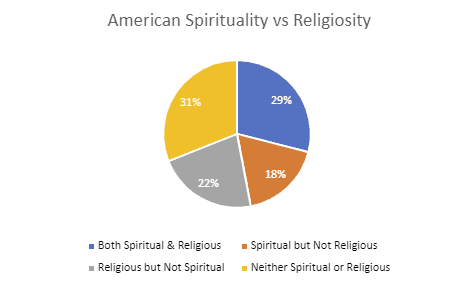Using Spirituality to Improve Mental Health
Spirituality can complement and improve your mental health. As American writer and journalist Elizabeth Gilbert has said, “God dwells within you; as you. God dwells within me; as me.” You can use spirituality to help address your mental health concerns. But how? Read on to learn more about using spirituality to improve mental health.
Note: This blog was authored by former CFR Staff Therapist Chimère G. Holmes, MA, MSEd, LPC.

Elizabeth Gilbert’s (pictured here) 2003 memoir, Eat, Pray, Love, focuses on themes of spirituality and romance.
Spirituality Can Positively Impact Your Mental Health
Whether an individual identifies as religious or spiritual, they are ultimately tapped into a higher power that influences their outlook, values, and approach to life. Religion is composed of a specific set of organized beliefs and practices that are shared within a devout community, whereas spirituality is considered more of an individual practice with emphasis on peace, purpose, and connection with others. Both religion and spirituality share tenets of belief, comfort, reflection, ethics, and awe. Famed author Elizabeth Gilbert of “Eat, Pray, Love” once described the Divine as, “the perfection that absorbs.” As an ordained minister and licensed clinician, who has dedicated most of my adult career to these two disciplines, I could not agree with Gilbert more.
There is a gorgeous interplay between spirituality and psychology and when approached from a stance of humility and curiosity, my clients are pleasantly surprised at the complementarity between both schools of thought along with the countless ways that psychology and spirituality can positively impact their mental health. Oftentimes, those who subscribe to a spiritual path/practice are open to seeking greater understanding concerning their life’s purpose, professional vocation, relationships, values, and destiny.

According to the Public Religion Research Center, Americans are relatively split between whether they are spiritual, religious, both, or neither.
Using Spirituality to Improve Mental Health
As data regarding the connection between the mind and body continues to emerge, it becomes clearer that spirituality and faith can greatly complement one’s emotional wellness, even improving certain mental health conditions, including but not limited to: grief, bereavement, trauma, stress, low self-esteem, anxiety, and depression. In some instances, people turn to their faith in times of tumult and crisis in order to make meaning and recover. At other times, individuals integrate routine spiritual practices such as prayer, devotionals, praise and worship, studying scripture, meditation, yoga, chanting, or spending time in nature as part of their routine coping skills to quell feelings of stress, angst, or depression.
Some of the benefits of partaking in either a religious and/or spiritual community include: cultivating an established sense of belonging; meaningful social connections with like-minded individuals; and trustworthy and safe social engagement. Attending congregational gatherings such as Sunday service, Saturday Torah readings, consecrated times of prayer at a mosque, or worship at Hindu temples provides structure and intentional socialization. Such gatherings lower anxiety and lift low moods by creating safe and empathic spaces where people can be vulnerable about life’s trials and tribulations, including mental illness or family discord.
Spirituality & Self-Care
Spirituality correlates with self-care, which is any intentional action we take to care for our physical, mental, emotional, and spiritual health. The following are examples of spiritual self-care that can impact our mental health:
- Listen to music
- Practice radical acceptance
- Understand what you can control and what you cannot
- Cultivate a gratitude practice
- Light soothing, scented candles
- Spend 10 minutes a day in nature
- Practice your faith and spirituality wherever applicable
- Meditate silently during the workday
- Read inspirational quotes/articles/books

Australian Psychologist Sebastian Salicru has written for Psychology Today and other publications on the intersection of spirituality and mental health.
A Spirituality Journey All Your Own
For some people, their spiritual path is invaluable because it affords insight for understanding each of our unique human experiences. Major world religions offer explanations of why suffering exists in the world. For those who subscribe to religious belief systems, these explanations yield a tremendous sense of comfort to those diagnosed with mental illness or struggling interpersonally in relationships. Research suggests that both science and spirituality can serve as companions in helping to answer life’s “why me?” or “why now?” questions. You can access the benefits of peace and relaxation in the company of others or in the comfort of your own home. It is important to think of places, people, and experiences that provide a sense of meaning and solitude when considering a spiritual practice that is most relevant for you and your mental health needs.
More from CFR
Council for Relationships is a nonprofit organization with over 80 therapists and psychiatrists across Pennsylvania and New Jersey. Whether you’re navigating intergenerational trauma, seeking support for anxiety, or exploring relationship dynamics, our clinicians are here to help.
- Get matched with a CFR therapist who meets your needs
- Sign up for our newsletter for mental health tips, updates, and events
- Explore more blogs on trauma, healing, and Holocaust remembrance
Get Matched | Subscribe | Read More
